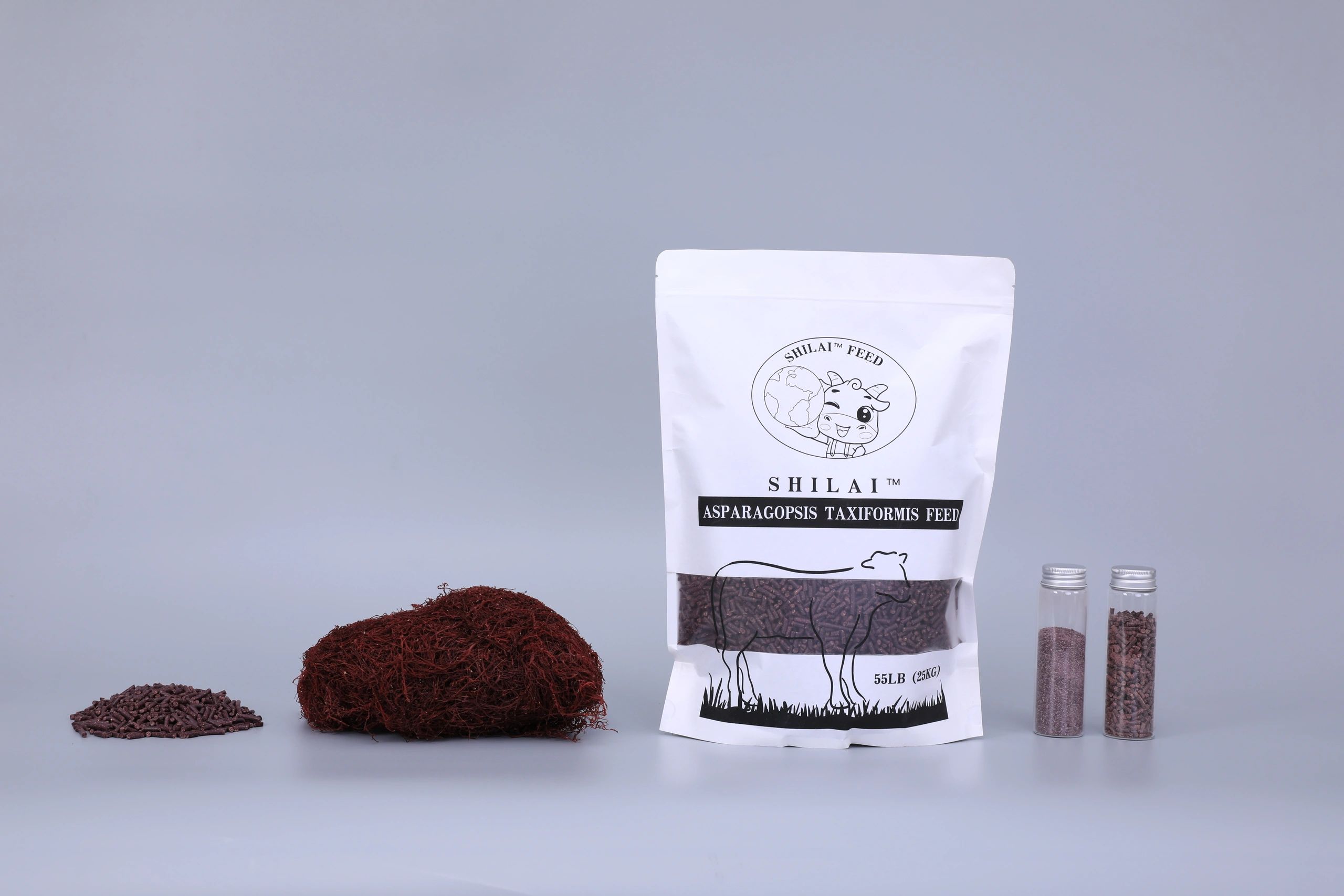Global food production systems generate a considerable amount of greenhouse gases, chiefly from livestock rearing.
Methane is an especially potent greenhouse gas with a greater climate forcing effect than CO2, raising major concerns.
The red seaweed Asparagopsis taxiformis is under study for its capacity to reduce methane emissions from livestock digestion.
The seaweed’s active substance disrupts microbial methane production in the rumen, cutting animals’ methane emissions.
Adding Asparagopsis taxiformis to feed rations has shown positive findings in pilot studies that indicate a feasible way to lower emissions from livestock.
- Moreover, Asparagopsis taxiformis offers several additional commercial and environmental advantages.
- Elevated animal welfare and condition
- Potential to stimulate rural economies via seaweed value chains
More evidence and development remain essential, but Asparagopsis taxiformis offers considerable potential for sustainable emission reduction.
Leveraging Asparagopsis taxiformis Powder to Improve Animal Feeds
Using Asparagopsis taxiformis in powdered concentrate form could markedly improve feed solutions for livestock.
Its profile of nutrients and active substances has the potential to raise livestock productivity and health.
Adding A. taxiformis powder to formulations has produced methane reductions in experiments and may enrich feeds with vital micronutrients.
Further rigorous research is crucial to optimize dosage, processing, and long-term safety to unlock full commercial potential.
The Promise of Asparagopsis taxiformis for Greener Animal Agriculture
Asparagopsis taxiformis is becoming notable as an option to confront the environmental issues driven by common animal agriculture practices.
Using the algae as a feed ingredient offers a pathway for farmers to reduce methane and improve the environmental profile of production.
Studies have reported potential co-benefits for animal welfare and productivity when Asparagopsis is used in feed.
Broader and longer studies are essential for confirmation, although early evidence is strongly positive.
Methane Reduction Through Asparagopsis Feed Additive
Asparagopsis is recognized as a strong candidate for reducing the methane burden from ruminant livestock.
The mechanism involves the seaweed’s compounds blocking or inhibiting the microbes that produce methane in the rumen.
- Experimental studies have reported large percentage reductions in methane when Asparagopsis is included in diets.
- Using the seaweed in feed formulations is a sustainable pathway to cut enteric methane emissions.
- Many producers are investigating the feasibility of integrating Asparagopsis into routine feeding practices.
Asparagopsis: The Marine Ingredient Shaping Sustainable Livestock Systems
From ocean science to farm practice, Asparagopsis taxiformis is an emerging contender for sustainable methane mitigation.
- Researchers adding Asparagopsis to rations observed substantial methane declines, indicating major environmental benefits.
- The approach may enable more sustainable food systems that reduce emissions while maintaining farm productivity.
In the search for scalable climate solutions, Asparagopsis is highlighted as a promising and practicable methane mitigation tool.
Refining Asparagopsis taxiformis Feed Strategies to Improve Methane Reduction
Scientific teams are investigating best-practice processing and dosing to improve the performance of A. taxiformis in feeds.
The Science Behind Asparagopsis taxiformis's Methane-Lowering Effects

Scientists attribute the effect to Asparagopsis compounds that impair the methanogenesis process in the rumen.
Bromoform and related halogenated compounds are thought to play a major role in disrupting methane production, with ongoing safety studies.
Embedding Asparagopsis in Feed Formulations to Drive Sustainable Farming
Asparagopsis’s nutritional profile and methane-cutting bioactives make it an attractive candidate for inclusion in modern feed formulations.
Using the algae in diets can boost nutrient supply, aid digestive function, and impart beneficial antimicrobial attributes.
Leveraging Asparagopsis taxiformis for Environmental Gains in Food Production
Asparagopsis taxiformis offers a natural pathway to mitigate climate impacts associated with livestock and contribute to sustainable food systems.
- Additionally, the species offers a useful blend of nutrients that complement feed formulations.
- Researchers and industry are collaboratively exploring how Asparagopsis can be used across food and aquaculture sectors.
Mainstreaming Asparagopsis use has the potential to achieve measurable reductions in the environmental effects of livestock agriculture.
Benefits of Asparagopsis Feed Additive on Animal Health and Productivity
The algae’s profile suggests it could function as a feed supplement that improves both sustainability and livestock outcomes.
Asparagopsis supplementation has been linked to higher nutrient absorption and feed efficiency, benefitting weight and health.
The algae may also exhibit antioxidant and immune-supporting properties that help fortify animal resilience and reduce disease risk.

With demand for greener livestock increasing, Asparagopsis stands out as a promising option as R&D and industry adoption progress.
A Sustainable Trajectory: Methane-Cut Feeds Based on Asparagopsis
In response to carbon-reduction imperatives, Asparagopsis could play a role in reducing the climate footprint of livestock farming.
- Researchers suspect the algae’s molecules interfere with the biochemical steps of methanogenesis, reducing methane generation.
- Trials and experiments have produced promising results, showing substantial methane reductions when Asparagopsis is included in diets.
Asparagopsis-based feeds may enable a transition to more climate-friendly and resilient agricultural practices.